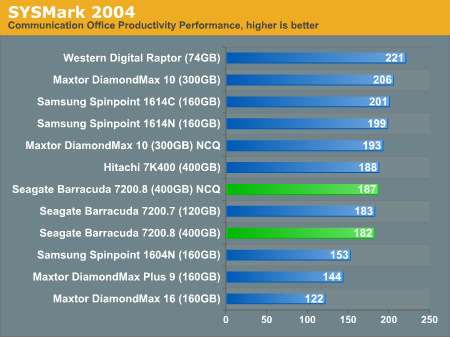Seagate Barracuda 7200.8: 400GBs with NCQ
by Purav Sanghani on April 20, 2005 4:30 PM EST- Posted in
- Storage
Overall System Performance - SYSMark 2004
SYSMark 2004 is divided into two separate suites: Internet Content Creation and Office Productivity. What makes SYSMark an ideal hard disk benchmark is that its scores are totals of response times, meaning that the benchmark measures how long the system takes to respond to a task (e.g. how long before a search and replace is completed after it is initiated) and sums up all such response times to generate a score. This score is generated for six total subcategories: three under Internet Content Creation and three under Office Productivity.For the most part, SYSMark is CPU/platform bound, but we will see some variations in performance according to disk speed. At the same time, there are a couple of benchmarks within SYSMark that are heavily disk dependent.
Internet Content Creation Performance
Our results showed very little difference in the performance of the competitors; not enough to rule out margin of error in the Content Creation part of SYSMark 2004. The scores for the majority of drives landed between 180-183, which does not illustrate too well the drive that performs better than the rest.Office Productivity Performance
SYSMark's Office Productivity suite consists of three tests, the first of which is the Communication test. The Communication test consists of the following:"The user receives an email in Outlook 2002 that contains a collection of documents in a zip file. The user reviews his email and updates his calendar while VirusScan 7.0 scans the system. The corporate web site is viewed in Internet Explorer 6.0. Finally, Internet Explorer is used to look at samples of the web pages and documents created during the scenario."

The Communication test, on the other hand, is disk dependant, which shows in our results. With Western Digital's Raptor ruling the charts so far, the 400GB 7200.8 just can't seem to keep up with the other drives in this scenario, coming in at 7th place, below the 120GB 7200.7 with a score of 182.










44 Comments
View All Comments
PuravSanghani - Wednesday, April 20, 2005 - link
mjz5: With our nForce4 platform there is an option under the drive controllers options tab called "Enable command queuing". By checking this option and restarting the system, command queuing will be enabled. Some boards, however, enable NCQ/TCQ by default through the BIOS. You may want to check with your motherboard manual on that.Take care,
Purav
mjz5 - Wednesday, April 20, 2005 - link
Nighteye2 has a good question. How does NCQ work with RAID arrays? Is it better, worse???How would I know if TCQ is enabled on my 74 raptor?
xsilver - Wednesday, April 20, 2005 - link
#21 LOL --- you wouldnt want that space anyways even if it was there.... its cant be guaranteed reliable so would you trust 100gb's of your drive that could die at any moment???quorm - Wednesday, April 20, 2005 - link
I have one of the 300gb 7200.8 drives. It's mentioned in the article that all of the 7200.8 drives use a 3x133gb platter configuration. I was wondering if there is any hack to allow access to the remaining 100gb of disk space. Anyone?AtaStrumf - Wednesday, April 20, 2005 - link
Hey, where did all the WD drives (apart from Raptor obviously) go??? I can get a 200 GB PATA model pretty cheap, so I'm seriously considering it. Any advice anyone?n7 - Wednesday, April 20, 2005 - link
Thanx for the review guys :)flatblastard: I'd agree.
The Raptors may not win all the benches, but i find they feel so much snappier than my other 7200RPM drives.
I certainly wouldn't mind adding a 400 Gb Seagate to my collection though :)
bob661 - Wednesday, April 20, 2005 - link
Can you guys post a UT2004 for load time graph please.flatblastard - Wednesday, April 20, 2005 - link
I'm using the raptor for my OS, and the 250GB seagate 7200.8 for everything else. I really can't tell which one is faster at loading games...but the raptor is MUCH quicker loading anything else.Icehawk - Wednesday, April 20, 2005 - link
Where were the heavier real-world multi-tasking tests like in the Intel DC previews? In those articles it appeared that NCQ offered some performance boost in heavy I/O situations - here it seems to offer zero benefit.Houdani - Wednesday, April 20, 2005 - link
I dunno. Neither the Seagate nor the Maxtor NCQ drive really impressed me. They didn't stand out from the peleton. For most performance needs, I'd have to give the yellow jersey to the Raptor, although the idle heat is a noteworthy ding.For extra capacity one of the larger models would be prudent, but for a primary drive the Raptor is fairly impressive.